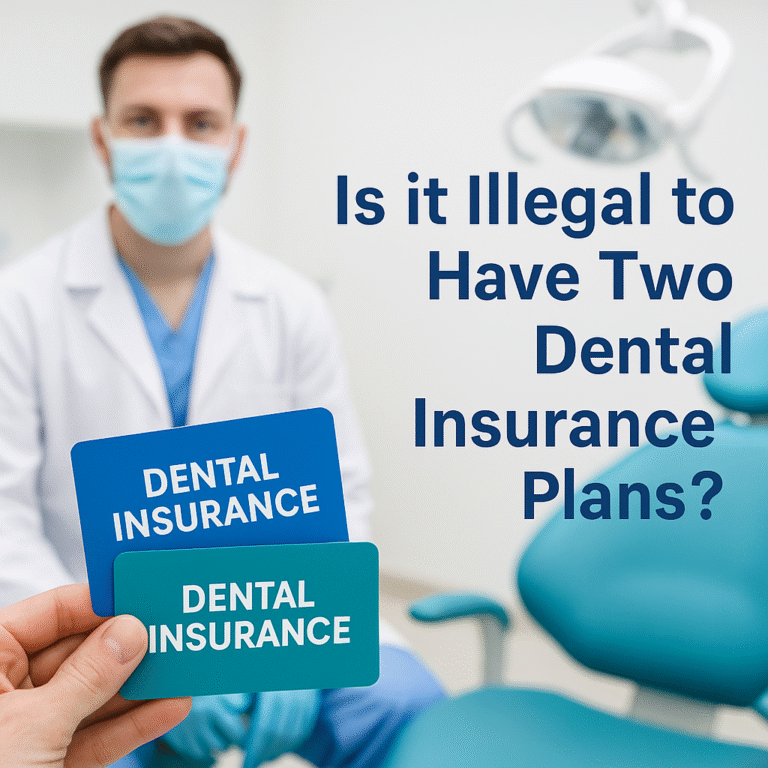Navigating dental insurance can be confusing, especially when considering the option of dual coverage. A common question people ask is: is it illegal to have two dental insurance plans? The short answer is no, it is not illegal. But understanding how it works can save you time, money, and headaches. Let’s explore everything you need to know about this topic with clarity, positivity, and expert-backed facts.
What Does It Mean to Have Dual Dental Insurance?
Having dual dental insurance simply means that you are covered by two separate dental plans at the same time. This can happen for several reasons. Perhaps you’re employed and also covered under your spouse’s plan. Or maybe you have private dental insurance in addition to one provided by your job. Both plans can work together to help reduce your out-of-pocket expenses—if coordinated properly.
Is It Illegal to Have Two Dental Insurance Plans?
It is absolutely not illegal to carry two dental insurance policies. However, legality does not mean that you can use them without rules. The key here is transparency and honest reporting. Insurance fraud—like purposely billing both policies for the same full amount—is illegal. As long as you follow guidelines and coordinate benefits correctly, you are fully within your legal rights.
How Coordination of Benefits (COB) Works in Dental Insurance
When you have dual dental insurance, insurance providers use a system called Coordination of Benefits (COB) to decide which plan pays first. The primary insurance pays its share, then the secondary may cover remaining costs. For dependents, the “birthday rule” usually applies—whichever parent’s birthday comes first in the calendar year has the primary plan.
Pros and Cons of Having Two Dental Insurance Plans
This strategy can bring big benefits, but also has challenges:
Advantages:
- Higher overall coverage
- Lower out-of-pocket costs
- More dental services may be covered
Disadvantages:
- Complex paperwork
- Claims can be denied if COB is not followed
- Requires extra effort from you and your provider
When Having Two Dental Plans Makes Sense
Dual dental coverage can be a smart choice in specific cases:
- Both you and your spouse have strong employer-based plans
- You’re undergoing major dental procedures like implants or braces
- Your children are covered by both parents’ insurance
These situations often result in more cost-efficient care and better coverage.
Situations Where Dual Coverage Can Backfire
If not properly coordinated, dual coverage can lead to trouble:
- Insurance companies may delay or deny claims due to confusion
- Some providers may not handle dual claims well
- You might accidentally commit insurance fraud by duplicate billing
To avoid these issues, always inform your dental office and both insurance companies about your dual coverage.
How to File a Dental Claim with Two Insurance Plans
Here’s a simple process to follow:
- Tell your dental provider about both plans
- The provider sends the claim to the primary insurer first
- Once processed, send the Explanation of Benefits (EOB) to the secondary insurer
- The secondary insurer processes the balance (if applicable)
It’s best to double-check with both companies to ensure proper coordination.
Common Mistakes to Avoid with Two Dental Insurances
- Failing to inform one or both insurers about your dual coverage
- Assuming 100% of all costs will be covered
- Relying solely on your dental provider to manage the paperwork
Avoiding these mistakes ensures smoother claim processing and less stress.
What Insurance Companies Say About Dual Dental Coverage
Most major providers, like Delta Dental, MetLife, and Cigna, acknowledge dual coverage and have established COB policies. They make it clear: dual coverage is legal and beneficial—as long as it’s not misused.
Always check your insurance provider’s terms. For example, if you’re looking into technologies like Omnipod or new treatments, research which insurance companies cover Omnipod 5 to ensure you’re aligned with your plan benefits.
Expert Advice: When to Use or Avoid Dual Dental Coverage
Dental professionals and insurance agents agree: dual dental insurance can be a game-changer for families and individuals with high dental needs. However, it’s not always necessary. In some cases, having a single strong plan or adding supplemental dental coverage might make more sense.
Ask a trusted agent or provider to help assess your situation. Also, understand key insurance terms—like what is SIR in insurance (Self-Insured Retention)—so you can better manage your plan.
Conclusion: Is Dual Dental Coverage Right for You?
Dual dental insurance is legal, and it can be incredibly valuable when used wisely. With proper coordination, it can boost your coverage, minimize costs, and help you get the care you deserve. But it does require attention to detail and proactive communication.
If you’re someone with frequent dental needs or access to two quality plans, it might be the perfect fit. Just make sure you’re following the rules, staying informed, and working with providers who understand COB. Your smile—and wallet—will thank you.
FAQs About Is It Illegal to Have Two Dental Insurance Plans
Can I legally have two dental insurance policies?
Yes, it is completely legal to have two dental insurance plans, as long as you report them honestly and follow Coordination of Benefits rules.
Who pays first if I have two dental insurances?
Typically, the insurance linked to your employer is primary. For dependents, the “birthday rule” often determines which parent’s plan pays first.
Will I get 100% coverage with dual dental insurance?
Not always. Coordination of Benefits ensures that insurers don’t pay more than the total cost. So, even with two plans, you may have some out-of-pocket costs.
How do I file dental claims with two insurances?
Start with your primary insurer. Once you get the EOB, forward it to the secondary insurer along with the claim. Your provider can help but should not be your only resource.
Can having two dental plans cause issues?
Yes, if you don’t coordinate them properly. Mistakes can lead to delayed claims, denied payments, or even accusations of fraud. Always be upfront and accurate with your information.
